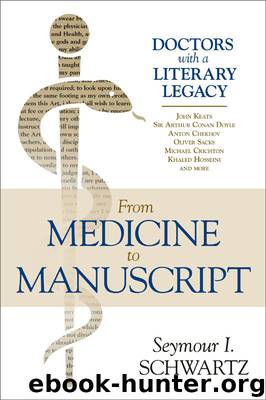From Medicine to Manuscript by Seymour I. Schwartz

Author:Seymour I. Schwartz
Language: eng
Format: epub
ISBN: 9781633884342
Publisher: Prometheus Books
SOURCES
Hastings, Selina. The Secret Lives of Somerset Maugham: A Biography. London: John Murray, 2009.
Meyers, Jeffrey. Somerset Maugham: A Life. New York: Alfred A. Knopf, 2004.
Strauss, M. B. Familiar Medical Quotations. Boston: Little, Brown, 1968.
Swinton, W. E. “Physicians in Literature: Part IV: Somerset Maugham, Talented But Troubled.” CMA Journal 114 (January 10, 1976): 61–67.
The “In Memoriam,” which appeared in the Annals of the Royal College of Surgeons of England on the occasion of the passing of James Johnston Abraham, referred to the “very full life as surgeon, soldier, author and publisher” of a loyal member, who died seven days before his eighty-seventh birthday. Although his name and accomplishments currently are recognized by but a few, his presence as a surgeon was of great significance and his contributions to literature had enjoyed an appreciable readership.
Abraham was born on August 16, 1876, in Coleraine, County Derry, Northern Ireland, the descendant of an officer in Cromwell's army. He received his early schooling at the Coleraine Academical Institution and proceeded to Trinity College, Dublin, in 1894 to prepare himself for a career in medicine. While at Trinity College, he received the New Shakespeare Society Prize and the Gold Medal in Natural Science. He graduated in 1898 with a bachelor of arts in English. The chair of English counseled Abraham to pursue a career in medicine rather than literature, invoking Charles Lamb's advice, “Literature is a bad crutch but a good walking stick.”
Abraham qualified MB BCh and BAO after an internship at Dr. Steevens’ Hospital in Dublin. For a brief period, he was a medical officer at the private asylum Farnham House in Dublin, and later practiced venereology in County Clare, but, in 1901, he moved to become senior house surgeon to Mr. C. B. Keetley at the West London Hospital. After contracting a nonspecific illness in his lungs, Abraham spent six months as a ship's surgeon traveling to Japan and Java.
While preparing for the final examination for a fellowship at the Royal College of Surgeons of England, Abraham worked as a resident medical officer (RMO) at the London Lock Hospital for Women on Harrow Road. During his time as RMO, the bacterial cause of syphilis was discovered and the Wasserman blood test was introduced. These advances led to Abraham's selection of the subject for his thesis “Recent Advances in the Diagnosis and Treatment of Syphilis,” which, when accepted, qualified him for an MD degree.
He next became house surgeon to Mr. Ernest Miles of eponymous fame at the Gordon Hospital, and, subsequently, he was appointed registrar at the London Lock Hospital, an institution with which he had a forty-five-year association. That hospital became part of Paddington Hospital until it closed in 1952. Abraham completed the requirements and became a fellow of the Royal College of Surgeons of England.
His first book, The Surgeon's Log: Being Impressions of the Far East, which stemmed from his travels as the ship's surgeon aboard the Clytemnestra, was published in 1911 and received favorable reviews. Over the ensuing fifty years, it appeared in thirty editions and sold over a half million copies.
Download
This site does not store any files on its server. We only index and link to content provided by other sites. Please contact the content providers to delete copyright contents if any and email us, we'll remove relevant links or contents immediately.
Hit Refresh by Satya Nadella(8350)
When Breath Becomes Air by Paul Kalanithi(7284)
The Girl Without a Voice by Casey Watson(7276)
Do No Harm Stories of Life, Death and Brain Surgery by Henry Marsh(6346)
A Court of Wings and Ruin by Sarah J. Maas(6135)
Hunger by Roxane Gay(4241)
Shoe Dog by Phil Knight(4194)
Everything Happens for a Reason by Kate Bowler(4079)
A Higher Loyalty: Truth, Lies, and Leadership by James Comey(4047)
The Rules Do Not Apply by Ariel Levy(3924)
Tuesdays with Morrie by Mitch Albom(3852)
The Immortal Life of Henrietta Lacks by Rebecca Skloot(3838)
How to Change Your Mind by Michael Pollan(3693)
Millionaire: The Philanderer, Gambler, and Duelist Who Invented Modern Finance by Janet Gleeson(3584)
All Creatures Great and Small by James Herriot(3532)
Elon Musk by Ashlee Vance(3464)
Tokyo Vice: An American Reporter on the Police Beat in Japan by Jake Adelstein(3451)
Man and His Symbols by Carl Gustav Jung(3336)
The Money Culture by Michael Lewis(3300)
